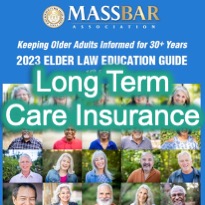Does Long Term Care Insurance Work for You?
Massachusetts has a Long Term Care Insurance incentive program that exempts an elder’s home from Medicaid liens. The Massachusetts LTC exemption protects the home from estate recovery. It is unique. No other state in the union has this protection. Insurance companies are required to notify and inform consumers about this exemption.
The exemption that is written into Massachusetts General Laws Chapter 118E, §33 saves an elder’s home from Medicaid long term care liens if the long term care insurance policy "when purchased, met the requirements of 211 CMR §65.00." The regulation at §65 requires the policy to provide a lifetime maximum benefit period of at least 730 days (2 years) of care beyond the policy's elimination period. Medicaid regulations at 130 CMR §515.014(A) say: the policy "must have available benefits of at least $125 per coverage day in a nursing facility," and any elimination period cannot last more than 365 days.
So, there are three important features that must be found in the policy: 1) coverage for at least two years of long term care, and 2) a daily benefit dollar amount of $125 and 3) elimination period (days on which services are provided to an insured before the policy begins to pay benefits) not longer than 365 days in a nursing facility or a deductible of no more than $54,750.
Because the Massachusetts law measures these requirements at the time the policy is purchased, elders can use the qualifying insurance policy to pay for community-based home care before they enter a nursing home, without fear of being disqualified by the two year requirement. The purpose of the law is to protect elders who use their long term care insurance for community-based care, so they can remain in their homes as long as possible.
Long Term Care Insurance is a valuable part of an estate plan for people who have substantial assets, savings and income. The National Association of Insurance Commissioners publishes a Shopper’s Guide that outlines what to look for in a LTC policy. Use the Guide to analyze whether a policy will work for you. Compare policy offerings and consider:
![]() What are the policy's limitations on home care? Are Home Care Costs Covered at all? How may days per week?
What Services are Covered? See pages 15 - 16 in the Shopper’s Guide
What are the policy's limitations on home care? Are Home Care Costs Covered at all? How may days per week?
What Services are Covered? See pages 15 - 16 in the Shopper’s Guide
![]() Does the policy pay family members for care giving?
Does the policy pay family members for care giving?
![]() Does the policy pay for 24 hour a day home care? (most do not)
Does the policy pay for 24 hour a day home care? (most do not)
![]() What level of physical and mental impairment does it take to get the policy to pay benefits? See page 18 in the Shopper’s Guide. Eligibility for coverage is based on whether or not a person can perform Activities of Daily Living. Make sure you understand the policy’s definition of ADL's. People who are unable to perform these Activities of Daily Living, and who can't obtain adequate nutrition, usually require a caregiver to support them from 12 to 24 hours each day. ADL's include: Dressing
What level of physical and mental impairment does it take to get the policy to pay benefits? See page 18 in the Shopper’s Guide. Eligibility for coverage is based on whether or not a person can perform Activities of Daily Living. Make sure you understand the policy’s definition of ADL's. People who are unable to perform these Activities of Daily Living, and who can't obtain adequate nutrition, usually require a caregiver to support them from 12 to 24 hours each day. ADL's include: Dressing
Bathing
Toileting
Eating
Walking
Transferring between bed and chair
Compare ADL's to Independent ADL's. These are the activities that enable a person to live independently in a house or apartment, such as: preparing meals, performing housework, taking medication, going on errands, managing finances, and using a telephone. The Department of Veterans Affairs uses similar criteria when deciding whether to pay Aid & Attendance benefits for a veteran or spouse.
![]() How many months or days of care will the policy pay for? See page 17 of the Shopper’s Guide. Special review is needed for Massachusetts clients. Does the policy satisfy the MassHealth Medicaid Regulation 130 CMR §515.011(B) exception to the estate recovery? Subsection (B)(3) says the LTC policy must meet the requirements of 130 CMR §515.014.
How many months or days of care will the policy pay for? See page 17 of the Shopper’s Guide. Special review is needed for Massachusetts clients. Does the policy satisfy the MassHealth Medicaid Regulation 130 CMR §515.011(B) exception to the estate recovery? Subsection (B)(3) says the LTC policy must meet the requirements of 130 CMR §515.014.
![]() What is the daily benefit amount paid for care?
What is the daily benefit amount paid for care?
![]() Does the policy comply with the Division of Insurance notice and disclosure regulations? 211 CMR §65.09(1)(e)(2).
Does the policy comply with the Division of Insurance notice and disclosure regulations? 211 CMR §65.09(1)(e)(2).
![]() Does the policy satisfy the MassHealth/Medicaid Regulation 130 CMR §515.011(B) exception to the estate recovery? Subsection (3) indicates the long term care policy must meet the requirements of 130 CMR 515.014 (benefit coverage of at least 730 days covering at least $125 per day in nursing home (130 CMR §515.014(A).
Does the policy satisfy the MassHealth/Medicaid Regulation 130 CMR §515.011(B) exception to the estate recovery? Subsection (3) indicates the long term care policy must meet the requirements of 130 CMR 515.014 (benefit coverage of at least 730 days covering at least $125 per day in nursing home (130 CMR §515.014(A).
![]() How many months or days of care will the policy pay for?
How many months or days of care will the policy pay for?
![]() Will the policy pay enough to cover the private pay charges in a nursing home? Will the policy pay pay enough to avoid the over – under problem ? In this situation, a long term care insurance policy pay may some of the daily costs of nursing home care, but not quite enough to cover the nursing home’s private daily rate.
The elder is eligible for MassHealth/ Medicaid to cover her care, but only at a reimbursement rate that is lower than the private pay rate. Because Medicaid’s reimbursement rate is lower than nursing home’s private pay rate, the elder is stuck with the difference. The problem can be solved by re-applying for benefits after several months of spend-down.
Will the policy pay enough to cover the private pay charges in a nursing home? Will the policy pay pay enough to avoid the over – under problem ? In this situation, a long term care insurance policy pay may some of the daily costs of nursing home care, but not quite enough to cover the nursing home’s private daily rate.
The elder is eligible for MassHealth/ Medicaid to cover her care, but only at a reimbursement rate that is lower than the private pay rate. Because Medicaid’s reimbursement rate is lower than nursing home’s private pay rate, the elder is stuck with the difference. The problem can be solved by re-applying for benefits after several months of spend-down.
![]() What is the daily benefit amount paid for care?
What is the daily benefit amount paid for care?
![]() How is the daily benefit amount figured? Is it based on the actual out-of-pocket expenses that you incurred? Or, is it figured by an Indemnity Method? (a set dollar amount) or a
Disability Method (a full daily benefit even if you are not receiving any services)
How is the daily benefit amount figured? Is it based on the actual out-of-pocket expenses that you incurred? Or, is it figured by an Indemnity Method? (a set dollar amount) or a
Disability Method (a full daily benefit even if you are not receiving any services)
![]() What is the elimination period? See page 19 in the shopper’s Guide.
What is the elimination period? See page 19 in the shopper’s Guide.
![]() Is there a waiver of premium, when the client is receiving benefit payments from the insurance company? When does the premium waiver begin?
Is there a waiver of premium, when the client is receiving benefit payments from the insurance company? When does the premium waiver begin?
Long Term Care Insurance can be a valuable part of elder care planning, if you understand the terms and conditions of the policy.
